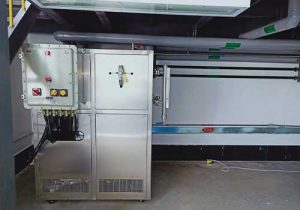modular chiller system
What is a Modular Chiller System?
A modular chiller system is a cooling solution that integrates multiple smaller chiller units into a single system. These units can operate independently or in tandem, allowing for flexible and scalable cooling capacity. Modular chiller systems are designed to adapt to changing cooling demands, making them ideal for applications with fluctuating loads.

How Does a Modular Chiller System Work?
The operation of a modular chiller system involves the following steps:
Load Assessment: The system assesses the cooling load and determines the number of chiller units required to meet the demand.
Independent Operation: Each chiller unit operates independently, providing a portion of the total cooling capacity.
Synchronization: The units work together to ensure consistent and efficient cooling.
Redundancy: If one unit fails, the remaining units can compensate, ensuring uninterrupted cooling.
Key Components of a Modular Chiller System
Chiller Units: Individual cooling units that make up the modular system.
Control System: Manages the operation and synchronization of the chiller units.
Piping and Valves: Connects the chiller units to the cooling load and ensures proper fluid flow.
Pumps: Circulate the cooling fluid through the system.
Heat Exchangers: Transfer heat from the process fluid to the refrigerant.

Types of Modular Chiller Systems
Air-Cooled Modular Chillers: Use air to dissipate heat from the refrigerant. They are compact and suitable for locations with limited water availability.
Water-Cooled Modular Chillers: Use water to cool the refrigerant, offering higher efficiency and better performance for large-scale operations.
Hybrid Modular Chillers: Combine air-cooled and water-cooled technologies to optimize performance and energy efficiency.
Applications of Modular Chiller Systems
Modular chiller systems are used in a wide range of industries, including:
Commercial Buildings: Providing cooling for offices, hotels, and shopping malls.
Industrial Processes: Maintaining optimal temperatures for machinery and production processes.
Data Centers: Preventing overheating of servers and IT equipment.
Healthcare Facilities: Ensuring precise temperature control for medical equipment and patient comfort.
Educational Institutions: Cooling classrooms, laboratories, and administrative buildings.
Benefits of Using a Modular Chiller System
Scalability: Easily expandable to meet increasing cooling demands.
Energy Efficiency: Operates only the necessary number of units, reducing energy consumption.
Redundancy: Ensures uninterrupted cooling in case of unit failure.
Ease of Maintenance: Individual units can be serviced without shutting down the entire system.
Flexibility: Adapts to varying cooling loads, providing optimal performance.

Choosing the Right Modular Chiller System
When selecting a modular chiller system, consider the following factors:
Cooling Capacity: Ensure the system can handle your current and future cooling requirements.
Energy Efficiency: Look for models with high Coefficient of Performance (COP) ratings.
Space Constraints: Choose a system that fits your available space.
Maintenance Requirements: Opt for systems with easy maintenance access.
Budget: Balance initial costs with long-term savings and performance.
Maintenance Tips for Modular Chiller Systems
Regular maintenance is essential to ensure the longevity and efficiency of your modular chiller system. Key maintenance practices include:
Cleaning condenser and evaporator coils.
Checking refrigerant levels and replenishing as needed.
Inspecting and replacing filters.
Monitoring system performance and addressing issues promptly.
Scheduling professional inspections and servicing annually.
Conclusion
Modular chiller systems are a versatile and efficient cooling solution for a wide range of applications. By understanding their working principles, components, and benefits, you can select the right system for your needs and ensure its optimal performance through proper maintenance. Whether for commercial buildings, industrial processes, or data centers, modular chiller systems deliver consistent and dependable cooling performance.
Related recommendations
industrial water cooled chillers
704Industrial Water-Cooled Chillers: Precision Temperature Control for Industry Industrial water-cooled chillers are essential in maintaining optimal temperatures within various industrial process...
View detailsCauses of Hydraulic Shock Failure of Low Temperature Chiller Compressor
1301Causes of Hydraulic Shock Failure of Low Temperature Chiller Compressor As a classification of industrial chillers, low-temperature chillers are widely used in industrial applications. During...
View detailswater cooled chiller and air cooled chiller
543Water-Cooled Chiller and Air-Cooled Chiller: A Comparative Analysis Industrial processes and commercial buildings rely on chiller systems to maintain optimal temperatures for comfort and proces...
View detailsrefrigerated water chiller
477Refrigerated Water Chiller Systems: Technology and Applications Refrigerated water chiller systems are essential in a variety of industries for maintaining precise temperatures. These systems a...
View details
 LNEYA Chiller
LNEYA Chiller






HelloPlease log in